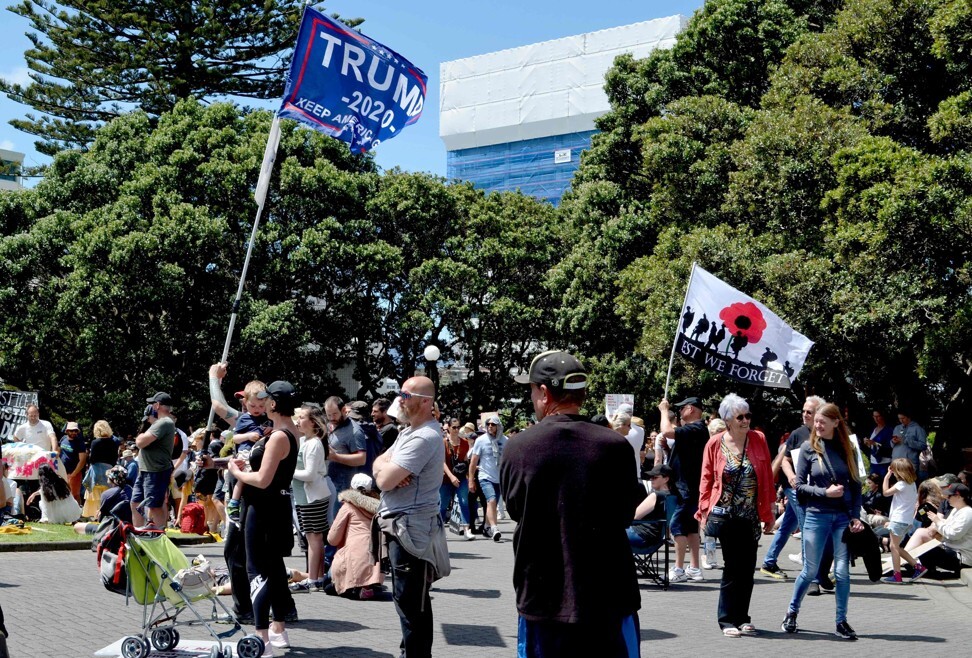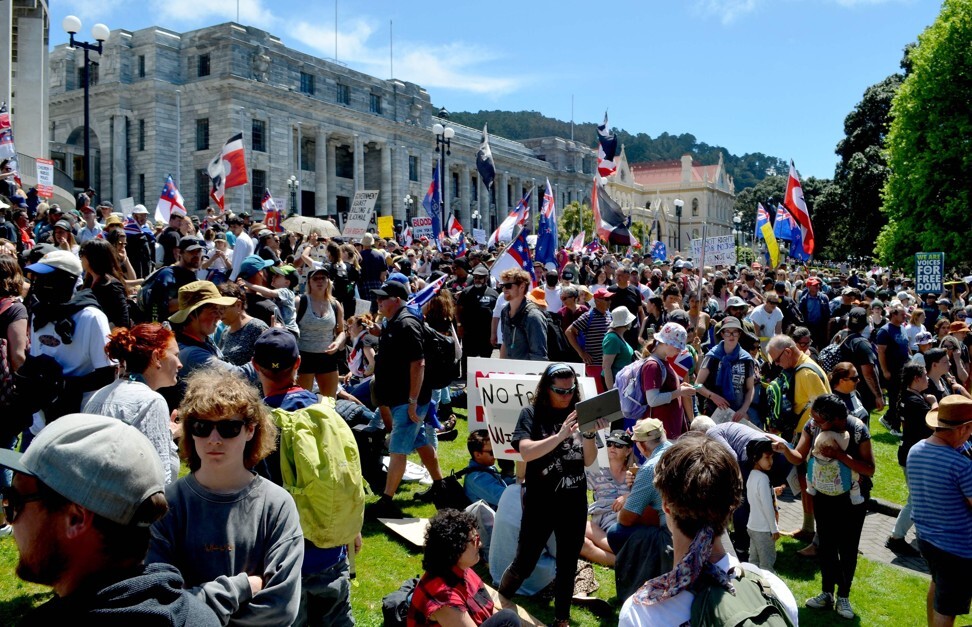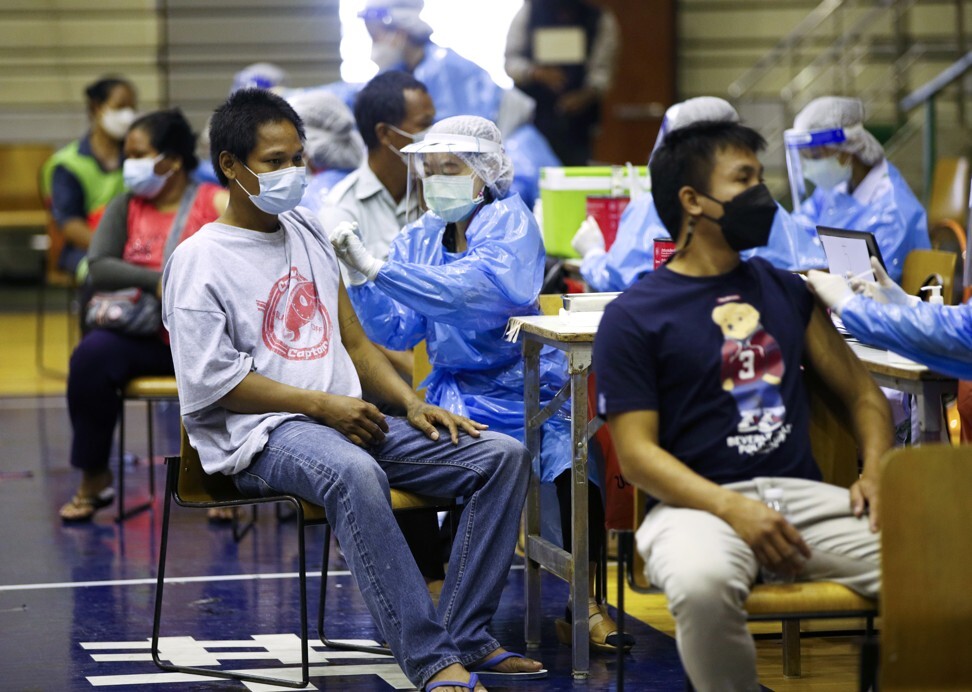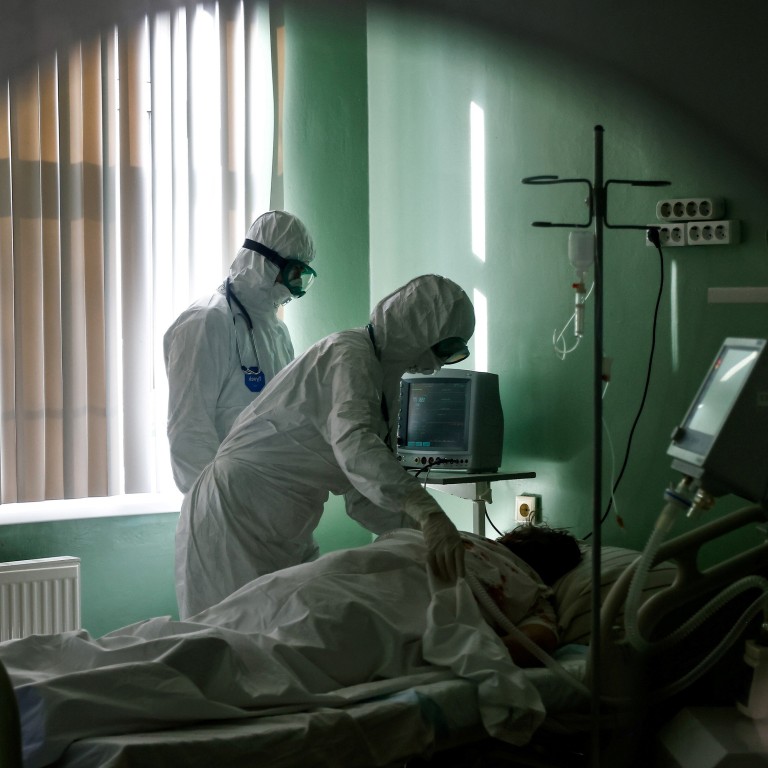
Coronavirus: unvaccinated people 16 times more likely to die, Australian report says
- Health data from Australia’s New South Wales state showed only 11 per cent of people who died from Covid-19 over four months were fully vaccinated
- Elsewhere, Singapore will stop footing medical bills of Covid-19 patients who are unvaccinated by choice, while thousands have protested against NZ’s vaccine mandates
The data from NSW health department out late on Monday showed only 11 per cent of people out of 412 who died from the Delta outbreak over four months through early October were fully vaccinated. The average age of those deaths was 82.
Only around 3 per cent of people in intensive care units had two doses, while more than 63 per cent of the 61,800 cases detected between June 16 and October 7 were unvaccinated.
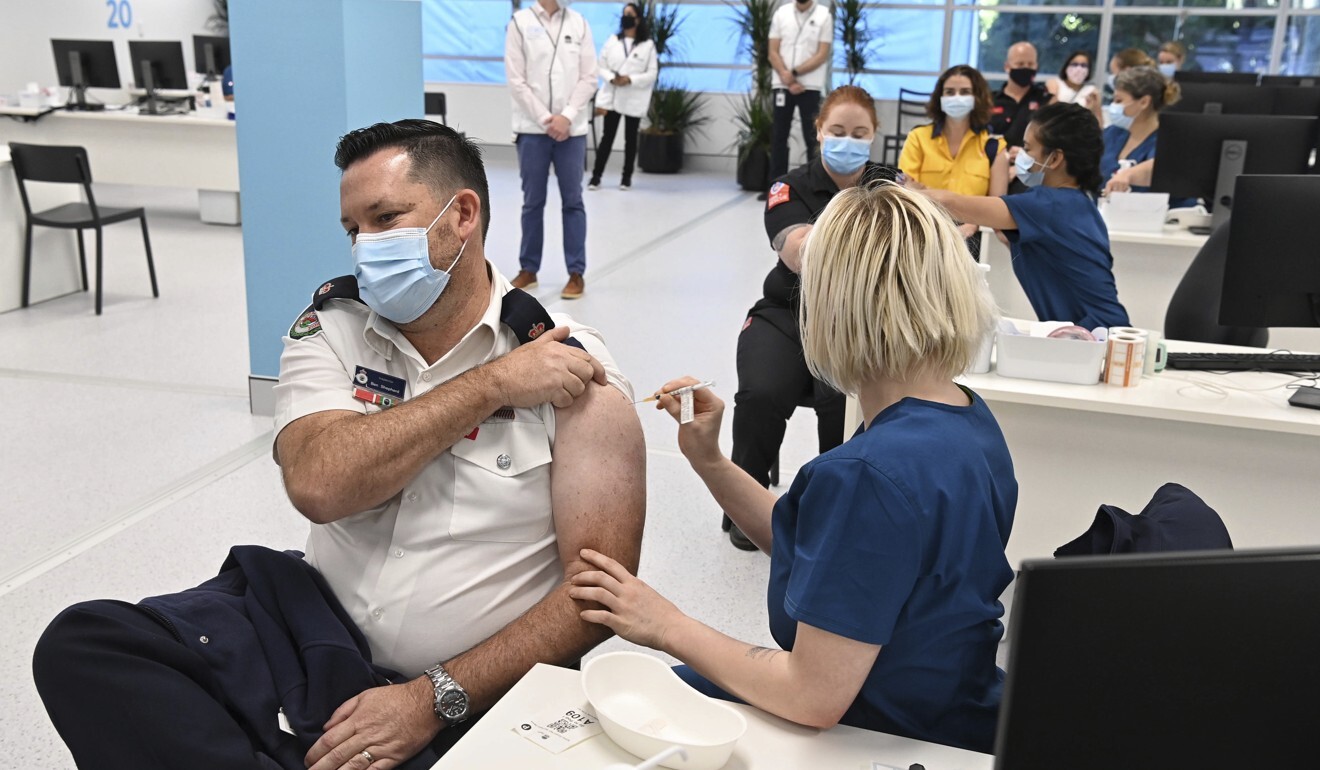
“Young people with two doses of a vaccine experienced lower rates of infection and almost no serious disease, while those unvaccinated in this age group were at greater risk of developing Covid-19 and needing hospitalisation,” NSW Chief Health Officer Kerry Chant said.
The report’s findings were in line with data from the US Centres for Disease Control and Prevention, which said in September that unvaccinated individuals were 11 times more likely to die from Covid-19 than those who were fully vaccinated.
Australia to send Cambodia 3 million vaccine jabs as minister makes Asia tour
Australia had stayed largely virus-free this year until an outbreak of the highly infectious Delta variant that started in June led to months-long lockdown in Sydney, Melbourne, its largest cities, and the national capital of Canberra.
The virus-hit cities have been easing tough restrictions after passing vaccination targets of 70 per cent and 80 per cent. The roll-out in NSW state, home to Sydney, appears to have plateaued after first-dose coverage reached almost 94 per cent of the population above 16.
More than half of Australia’s 1,841 deaths and about 87 per cent of its nearly 183,000 infections were because of the Delta strain. However, the death rate is lower than last year thanks to a surge in vaccinations since July.

01:43
Indonesia’s Covid-19 medical waste swamps country’s rubbish mountains
Singapore to stop paying medical bills for the ‘unvaccinated by choice’
Singapore will from next month stop paying coronavirus medical bills of those who are unvaccinated by choice, officials have said, as a fierce outbreak put the city state’s health care system under strain.
The tiny country is experiencing its worst Covid-19 wave since the start of the pandemic, reporting around 2,000-3,000 cases a day and a handful of deaths.
Singapore and Malaysia agree to quarantine-free vaccinated travel lane
The government had always covered the medical bills of all Singaporeans and other residents in certain categories infected with the virus, except for those who tested positive soon after returning from overseas.
But from December 8, authorities will begin charging Covid-19 patients who are unvaccinated by choice, the ministry of health said on Monday.
“Unvaccinated persons make up a sizeable majority of those who require intensive inpatient care, and disproportionately contribute to the strain on our health care resources,” the ministry said in a statement.
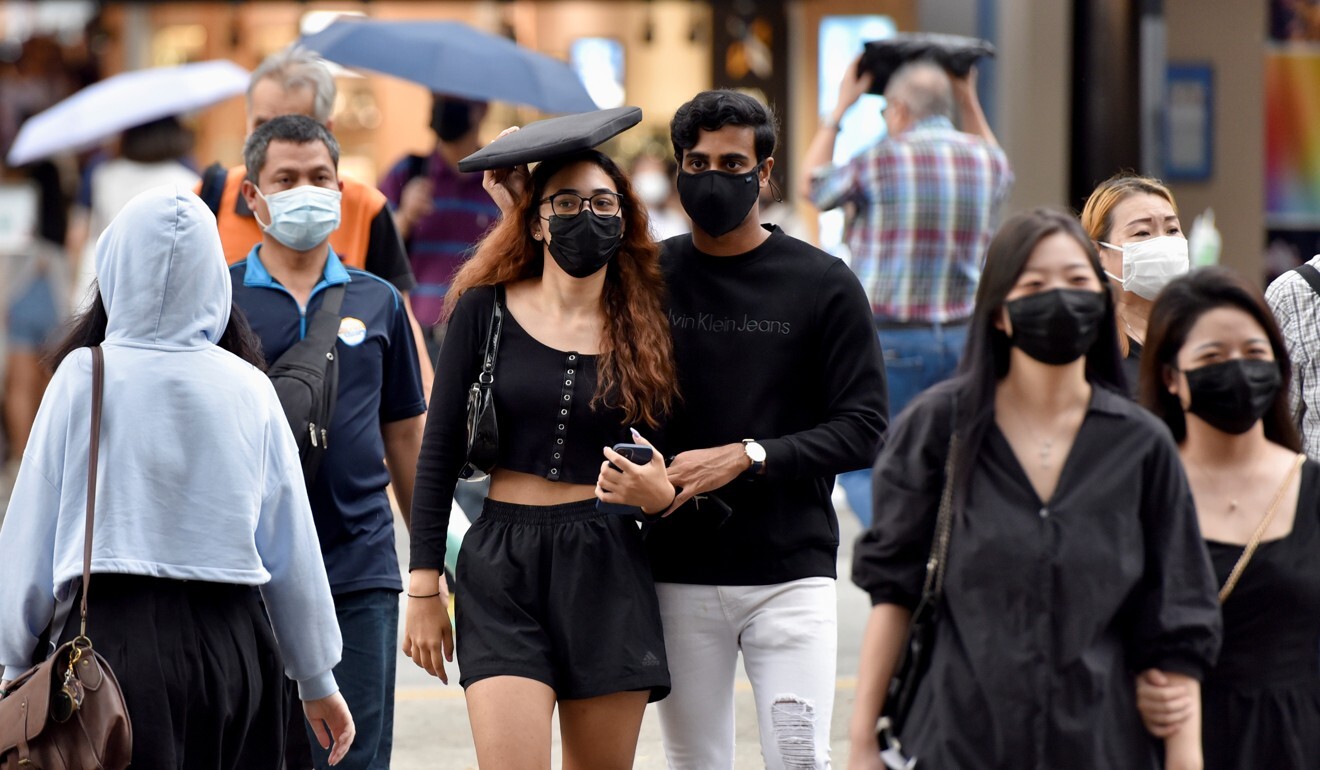
Those affected will still be able to use regular financing arrangements to cover the cost, such as private insurance.
Bills for those who are ineligible for vaccination – such as children under 12 or those with certain medical conditions – will still be fully paid.
Singapore has one of the world’s highest vaccination rates, with 85 per cent of its 5.5 million population fully inoculated.
It has had a mild outbreak by global standards, and only faced a substantial virus wave in recent months after being hit by the Delta variant.
Thousands protest New Zealand’s vaccine mandates
All but two entrances to the parliament building, known as the Beehive, were closed off in the presence of unprecedented levels of police and security personnel, as mostly unmasked protesters marched through central Wellington and congregated outside parliament.
While the demonstration was peaceful, many people were seen holding signs and placards with messages like “Freedom” and “Kiwis are not lab rats” and shouting slogans.
New Zealand has struggled to fight off a highly infectious outbreak of the Delta variant this year, forcing Prime Minister Jacinda Ardern to move from its strategy of elimination through lockdowns to living with the virus with higher vaccinations.
Ardern last month said the country would require teachers and workers in the health and disability sectors to be fully vaccinated against Covid-19, and has promised to end restrictions only after 90 per cent of the eligible population is inoculated.
That threshold is higher than many other countries and has invited criticism from people calling for more freedoms, while the mandate will be a hurdle for those looking to get back to work but still avoiding the jab.
New Zealand still has among the lowest Covid-19 cases in the world with under 8,000 cases reported so far and 32 deaths. Its total double-dose vaccination rate has reached nearly 80 per cent of the eligible population.
Meanwhile researchers in the country have voiced concerns that an “infodemic” is steering the vaccine hesitant toward extreme, far-right ideologies that target minorities.
A new report from The Disinformation Project at the University of Auckland points to a clear escalation in this type of material in the 12 weeks since the country’s largest city moved into lockdown.
What next for zero-Covid China, as herd immunity face Delta hurdle?
“Telegram channels and groups proliferate content which is violent, far-right, and related to the conspiracy theory QAnon, signalling a near-frictionless shifting of New Zealanders from vaccine hesitancy, to vaccine resistance, and then to content reflective of wider conspiratorial ideologies,” the report said.
They concluded that vaccine misinformation appeared to be used as a “kind of Trojan Horse for norm-setting” of far-right beliefs.
Thailand to reopen borders to foreign workers
Thailand plans to reopen its borders to workers from neighbouring Myanmar, Cambodia and Laos, a government official said on Tuesday, in a bid to ease a labour shortage that is hurting its export and tourism-dependent economy.
Pairote Chotikasathien, from the Ministry of Labour, said the rules relating to vaccination status for the migrant workers, quarantine procedures and Covid-19 testing would be decided on Wednesday.
Thailand’s big exporting industries such as food and rubber production rely heavily on migrant labour. But strict border controls and quarantine rules have virtually halted all labour migration.
Thailand ends quarantine for visitors from China, US, Singapore, others
Pairote estimated the country needed 420,000 foreign workers at this time, mostly in the construction, manufacturing and seafood industries. Many workers left the country as it battled its worst Covid-19 outbreak earlier this year and have not returned.
Some workers who remained in the country were placed in “bubble and seal” policies under factory and construction quarantine schemes.
Thailand has nearly 2 million confirmed infections and 19,764 deaths, the majority of which came after April when the Delta variant was detected among migrant workers in a construction camp.

01:04
Panic buying after China’s Covid-19 cases continue to surge
Bangladesh firm to sell generic version of Merck Covid-19 pill
Bangladesh’s Beximco Pharmaceuticals will start selling a generic version of Merck & Co’s antiviral pill following local regulatory approval, it said on Tuesday.
The announcement marks the launch of the world’s first generic version of Merck and Ridgeback Biotherapeutics’ tablet, molnupiravir, which has been touted as a potential game-changer in the fight against the coronavirus.
Molnupiravir received its first regulatory approval globally, in the UK last week. It is still under review in the United States and Europe.
Beximco will soon begin selling generic molnupiravir, a cheaper version of Merck’s branded pill, in Bangladesh, as it received emergency use authorisation for the treatment from the country’s Directorate General of Drug Administration, it said in a statement. Exports would depend on regulatory approvals globally, it added.
Merck did not immediately respond to a request for comment.
Pfizer in talks with 90 nations for its Covid-19 pill; Merck eyes China deal
The US drug maker has entered into licensing agreements with at least eight Indian drug makers for molnupiravir, aiming to turn the South Asian nation into a manufacturing hub to supply low- and middle-income nations.
These include Dr Reddy’s Laboratories, Cipla, Sun Pharma, Torrent Pharmaceuticals, Emcure Pharmaceuticals and Hetero, among others.
Beximco said it did not expect sales of the generic molnupiravir to significantly boost revenues, given the currently low Covid-19 infection rates in Bangladesh, which neighbours India.
Reporting by Reuters, NZ Herald


